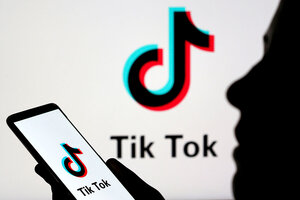Beyond silly videos: Why TikTok matters

As of November 2019, the video-sharing app TikTok has been downloaded 1.5 billion times, with 700 million active daily users.
Photo illustration by Dado Ruvic/Reuters
TikTok, a social network thought to be indispensable to Generation Z and incomprehensible to everyone else, is not just another smartphone app. The video-sharing service has become a cultural phenomenon on a par with YouTube and Instagram, complete with its own lingo, etiquette, and celebrities. As of late last year, it has been downloaded 1.5 billion times, with 700 million active daily users.
TikTok is also owned by ByteDance, a Chinese company. As it rises to become one of the world’s most popular online services, TikTok is also spreading norms that may stand at odds with the free-speech-über-alles ethos long advanced by Silicon Valley. U.S. military branches have banned the social media app on government-issued smartphones after the Pentagon warned them last month to delete the app.
What is TikTok?
It began in 2014 as a Chinese-owned platform called Musical.ly, where users could upload short looping videos of themselves lip-syncing songs. In 2018, Musical.ly merged with TikTok, another Chinese-owned video-sharing service launched a year earlier. Today, the app is known for viral lip-sync videos, silly pranks, memes, and “challenges” – some posed by the company itself. Compared with other social networks, TikTok skews very young.
Why We Wrote This
Adults often dismiss video-sharing apps as wastes of time. But with more than 700 million daily active users, the app TikTok has become a cultural touchstone for young people globally.
“The app has become very popular by successfully combining a lot of features of both current and defunct social media popular with youth,” writes Ioana Literat, Columbia University communications professor, in an email to the Monitor. “It revolves around creating short, looping, share-worthy videos just like the now-defunct Vine, it includes the aspirational you-can-become-a-famous-influencer-too ethos of Instagram or YouTube, while at the same time also capitalizing on existing friend networks just like Snapchat.”
But, as with any platform, people have found their own uses for TikTok, including political expression. “Teens are organizing strikes on TikTok, or sharing feminist performance art,” says Professor Literat. “Not all content is brainless fun.”
Does it matter that TikTok is owned by a Chinese company?
It does, because it shapes the terms of service and, importantly, determines where the user’s data is stored. For instance, Feroza Aziz, a high school student in New Jersey, learned this when she was blocked from her TikTok account after posting a 40-second clip about China’s crackdown on Muslim Uyghurs.
The company’s moderation guidelines, as reported by The Guardian, prohibited any “criticism/attack towards policies, social rules of any country, such as constitutional monarchy, monarchy, parliamentary system, separation of powers, socialism system, etc.” (These guidelines have since been changed, according to a TikTok spokesman.)
In December, TikTok admitted that it had policies suppressing videos of members of the LGBTQ community, people with disabilities, people with neurodiverse conditions, and obese people. The company said that the rules were in place to protect vulnerable users from cyberbullying. (These policies have also changed, according to the spokesman.)
“All social media platforms censor content, to greater or lesser degrees, and not always in keeping with their official terms and conditions,” writes Professor Literat. “However, when the Chinese government, one of the most powerful in the world, is a player in this equation, it all becomes infinitely more complicated, and the stakes are higher.”
David Carroll, a media design professor at The New School in New York City, understands very well how location matters when it comes to personal data. He was one of 87 million Facebook users in the United States whose personal information was used by the British firm Cambridge Analytica to target ads for Donald Trump’s 2016 campaign. He is trying to get his data back through the British legal system’s privacy protections.
“Where our data is stored is extremely significant because we can either gain or lose rights depending on it,” says Professor Carroll, whose efforts are chronicled in the Netflix documentary “The Great Hack.”
Is it OK to use TikTok?
“We make the best choices we can about using technologies, but we really don’t have enough information to make the most informed choices,” says Professor Carroll. “And in the case of TikTok, it’s even more difficult to get understandable answers.”
But, as with most technologies, it really depends on how you use it.
“I tend to be generally optimistic about youth online participation, so I do think TikTok can be a place of powerful self-expression, social connection, and yes, even meaningful political talk,” says Professor Literat, who also suggests older users might enjoy the app, too. “I’d say approach it with an open mind ... and buy into its very particular weirdness and charms.”
Editor’s note: This story has been updated to include comments from a TikTok spokesman.
